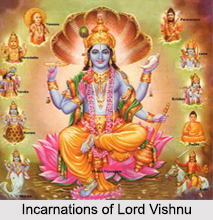 Types of Incarnations of Lord Vishnu are many in number. The term "Avatara" refers to the coming down of the Supreme Being down to a lower level, in different forms. The main basis for the five-fold conception of Avatara is the Pancharatra Samhitas. According to some of the Vaishnava Acharyas, the opening passage of the Taittiriya Narayana Upanishad refers to the fivefold manifestation of God. According to Vaishnavism, the Supreme Deity manifests Himself in 5 forms. These are;
Types of Incarnations of Lord Vishnu are many in number. The term "Avatara" refers to the coming down of the Supreme Being down to a lower level, in different forms. The main basis for the five-fold conception of Avatara is the Pancharatra Samhitas. According to some of the Vaishnava Acharyas, the opening passage of the Taittiriya Narayana Upanishad refers to the fivefold manifestation of God. According to Vaishnavism, the Supreme Deity manifests Himself in 5 forms. These are;
1. Para
2. Vyuha
3. Vibhava
4. Arca
5. Antaryami
These different forms are briefly discussed below.
Para Avatara: Para is the form of God that exists eternally in the Paramapada. It is regarded in a technical sense in that the manifested form of the Supreme Being in the Paramapada serves a specific purpose. Being a transcendental Supreme Being, he is present everywhere. This kind of a manifestation of the Supreme Being is regarded as Para Avatara which is known by the name of Para Vasudeva. The Pancharatra Samhitas describe Him as one endowed with all the six attributes- jhana, bala, aisvarya, virya, tejas, shakti. He is said to possess a spiritual body bedecked with the divine weapons and ornaments and also surrounded by His consorts, divine attendants and released souls.
Vyuha Avatara: The Vyuha Avatara is the manifestation of the Supreme Being in four different forms known by the names of Vasudeva, Sankarshana, Pradyumna and Aniruddha. Each vyuha is conceived with certain specific attributes and functions such as creation, sustenance, dissolution of the universe and promulgation of spiritual knowledge.
Vibhava Avatara: This is the third type of Avatara. The term Vibhava means manifestation of the Supreme Lord by assuming bodies similar to those of human beings or other living beings. The Vibhava Avatara constitutes the most important doctrine of Vaishnava theology.
Arca Avatara: The term "Arca" refers to idol worship. It is believed that when God listens to the ardent prayers of his devotees, he descends and enters into an idol created by human beings for the purpose of worship. This is considered as an Arca Avatara. The Sattvata Samhita says that God, by way of assuming a divine body corresponding to the idol made by an individual enters into it by becoming indistinguishable. When this takes place, the idol becomes sanctified with the divine presence in it.
Antaryami Avatara: This is the 5th kind of manifestation of God as indwelling in a subtle form in the inner recess of human hearts for purposes of meditation. The term "Antaryami" also refers to the indwelling spirit, that is the Supreme Being who is imminent in all sentient as well as non-sentient entities in the universe and who as the inner self, controls everything from within. As an Avatara, the Supreme Being as residing in the inner recess of heart assumes a subtle divine bodily form so as to enable the upashakti to meditate on God.









